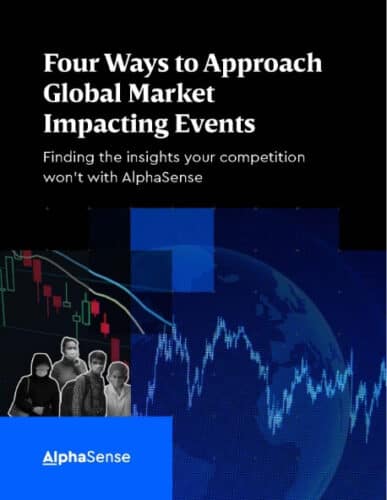For nearly a week, the Suez Canal, a major pathway among the world’s shipping routes, was blocked by a major container ship, the Ever Given. Despite the short-lived block, there were immediate after-effects and the long-term ramifications are still yet to be seen, though we have found a few key indications.
The Suez Canal is one of the most trafficked ports and to literally get around the block, companies were forced to re-route, take detours or opt for alternative shipping methods, causing delays and potentially losing any perishable products that were sitting in a freight container. While a blockage is extremely rare, the incident has forced scrutiny on the supply chain risk companies face, which may impact future strategies.
We took a look at some key players who had interesting insights and outcomes from the Suez Canal Crisis. In our research within the AlphaSense platform, we found a 566% increase across company docs and research mentioning the “Suez Canal” or “Suez Crisis” over the last 45 days (AlphaSense users, click here for a saved search link for the platform.)
The fallout from The Suez Canal: Who’s affected?
The losers
Insights and outlooks across multiple research and analyst reports pointed out that the most affected by the Suez Canal crisis would be industries reliant on container shipping, Panamax, and Supramax bulkers. This includes manufacturing plants and would affect European imports, resulting in items (such as toilet paper and coffee) being out of stock or having elevated prices.
In the U.S., some imports and retailers may be affected if there’s a measurable impact on container availability and, as you’ll see below, fashion retailers will also experience delays due to the Suez Canal crisis.
The winners
Many of the research documents we found pointed to a clear winner: the shipping industry. Freight, air freight, and container shipping companies are likely to benefit from this crisis due to rising shipping rates and because companies opted for different shipping routes, re-directions and alternate methods.
If you want access to real-time and after-market equity and broker research to inform your corporate strategy, check out AlphaSense’s Wall Street Insights, the only equity research offering built for the corporate market.
Key transcript statements around the Suez Canal crisis
Even after the block was removed, we have seen some companies specifically reference whether and how this crisis will impact them. Here are some key examples.
Flexible Solutions International, Inc | SEC 8-K Filing | AlphaSense Transcript
“Shipping and Inventory: Ocean shipping and land transport in the US are taking much longer than usual. 6 weeks from PO to receipt of product has become 3 months in some cases. The Suez Canal problem will exacerbate this for a few weeks. We are doing our best to cope with shipping issues by ordering far ahead but we warn that some disruption will be unavoidable.”
NEXT plc | 2021 Earnings Call | AlphaSense Transcript
“…we had around 2.5% of our stock that has been delayed as a result of the Suez crisis. So it’s an irritation, but it is not a major impediment to trade going forward. And we’re not expecting any impact on sales from that problem in the Suez Canal.”
Guess, Inc | Q4 2021 Earnings Call | AlphaSense Transcript
“We believe that the port congestion delays, including the recent event in the Suez Canal, will be normalized by the summer, and we have made provisions to anticipate the receipt of goods wherever possible to mitigate further delays.”
PVH Corporation | Annual Report (SEC 10K filing) | AlphaSense Transcript
“In addition, the shipping disruption occurring as a result of the temporary blockage of the Suez Canal…may also result in delays which impact our business, although currently such impact is expected to be minimal. We continue to monitor these delays and other potential disruptions in our supply chain and will implement mitigation plans if needed.”
Oxford Industries Inc | Annual Report (SEC 10K filing) | AlphaSense Transcript
“We have also experienced increases in freight costs and distribution and logistics functions as a result of the COVID-19 pandemic and other factors and may continue to see such cost pressures, including as a result of the recent blockage of freight through the Suez Canal.
The outlook for the future
Fortunately, many of the worst-case scenarios were avoided because the blockage only lasted a week. But it doesn’t mean companies won’t be feeling the after-effects of this disruption beyond Q1 and Q2 of this year. Along with the pandemic’s long-lasting effects, this may lead companies to take another look at their supply-chain and see what they can do to reduce the risk of a problem like this from happening again.
To get even more insights on the global market and how the pandemic recovery looks like, check out our Expert Briefing Series featuring Torsten Slok, Chief Economist at Deutsche Bank Securities.





